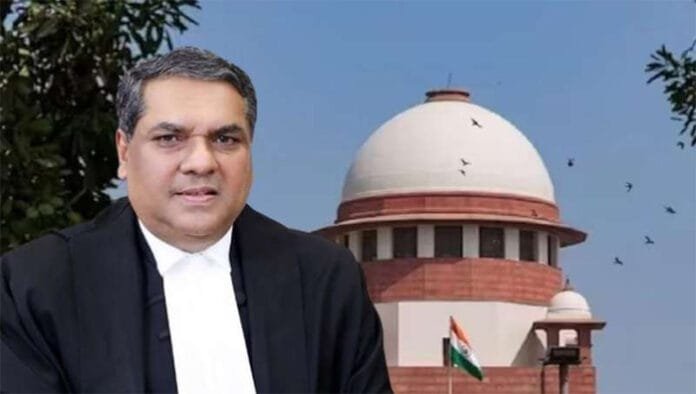Supreme Court Takes Suo Motu Cognizance
The Supreme Court of India on Wednesday took suo motu cognizance of the controversial ruling issued by the Allahabad High Court, which attempted to redefine the legal parameters of rape charges. The apex court, in response, stayed the remarks made by the High Court, emphasizing the need for a sensitive and legally sound approach in such cases.
The matter was heard by a bench comprising Justice B.R. Gavai and Justice Augustine George Masih. Expressing deep concern, the Supreme Court noted that the High Court’s ruling exhibited a lack of sensitivity and ignorance of legal principles. The apex court observed that despite the seriousness of the case, the judgment was delivered four months after being reserved, implying a questionable exercise of discretion.
Key Observations of the Supreme Court
The Supreme Court remarked:
- The judgment contained insensitive observations in paragraphs 21, 24, and 26, which did not align with the established legal framework.
- The court exercised its discretion to stay the controversial remarks immediately, despite its usual hesitation in such matters.
- A notice was issued to all parties, including the Central Government, the Uttar Pradesh State Government, and the Allahabad High Court.
- The Attorney General (AG) and Solicitor General (SG) were asked to assist the court.
- The petition filed by the victim’s mother was also tagged along with this matter.
What Did the Allahabad High Court Say?
The Supreme Court’s intervention came in response to an order passed by a single-judge bench of the Allahabad High Court that dismissed certain sexual assault allegations as not amounting to rape or attempted rape. The High Court, in its ruling, had stated that acts such as “holding the breasts of a minor and pulling the string of her pyjama” did not constitute rape or attempted rape under Indian law. Instead, the High Court categorized the offense under assault or use of criminal force with the intent to outrage a woman’s modesty.
The judgment was delivered by Justice Ram Manohar Narayan Mishra while ruling on a revision petition filed by two accused individuals. They had approached the court to challenge the order of a special judge in Kasganj, which had summoned them under Section 376 of the IPC in addition to other charges.
Public Backlash and Legal Experts’ Response
The Allahabad High Court’s ruling sparked nationwide outrage, drawing severe criticism from legal experts, activists, and political figures. Many condemned the judgment, stating that such a narrow and flawed interpretation of sexual assault laws could erode public trust in the judiciary.
Reactions from Legal Experts
- Senior advocates and legal scholars expressed concern that the ruling could set a dangerous precedent, weakening existing protections for women and minors under Indian law.
- Criminal law specialists emphasized that the ruling overlooked key provisions of the Protection of Children from Sexual Offenses (POCSO) Act, which deals with offenses against minors.
- Women’s rights activists argued that such judgments reflect an outdated and regressive mindset that fails to acknowledge the psychological and emotional trauma of victims.
Political and Social Reactions
- Several political leaders condemned the insensitive remarks made in the judgment.
- Women’s rights organizations demanded urgent judicial reforms to ensure that courts handle cases of sexual violence with greater sensitivity.
- The ruling triggered protests across various parts of Uttar Pradesh and other states, with demands for greater accountability in the judiciary.
Legal Implications of the Supreme Court’s Stay Order
The Supreme Court’s stay on the Allahabad High Court’s remarks carries significant legal implications:
- Judicial Accountability: The apex court’s intervention signals the need for greater accountability in the judiciary, particularly in cases involving sexual offenses.
- Reinforcement of Legal Precedents: By staying the controversial remarks, the Supreme Court ensures that existing legal principles related to sexual assault and rape laws remain intact.
- Protection of Victims’ Rights: The decision reinforces the protection of survivors, ensuring that courts adopt a victim-centric approach rather than issuing insensitive interpretations.
- Review of Judicial Discretion: The case highlights the importance of judicial discretion and calls for a review of how lower courts interpret sexual offense laws.
Upholding Justice and Sensitivity in Sexual Assault Cases
The Supreme Court’s decisive action in staying the Allahabad High Court’s remarks is a crucial step in ensuring that justice remains accessible to victims and that legal interpretations align with constitutional values. The case underscores the need for sensitivity and adherence to legal principles while adjudicating cases of sexual violence.
The issue is far from over, as further hearings will determine the final course of action regarding the High Court’s ruling. However, the Supreme Court’s intervention has sent a strong message about the importance of maintaining judicial responsibility and upholding the dignity of survivors in sexual assault cases.















